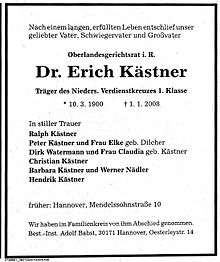Erich Kästner (World War I veteran)
| Erich Kästner | |
|---|---|
.jpg) | |
| Born |
10 March 1900 Leipzig-Schönefeld, Germany |
| Died |
1 January 2008 (aged 107) Cologne, Germany |
| Allegiance |
|
| Service/branch | Königlich-Sächsische Armee |
| Years of service |
July 1918 – November 1918 1939–1945 |
| Rank |
Private (WWI) Major (WWII) |
| Unit |
Sonder-Bataillon Hauck (WWI) Luftwaffe (WWII) |
| Battles/wars |
World War I World War II |
| Awards | Lower Saxony Merit Cross |
| Other work | Judge |
Erich Kästner (10 March 1900 – 1 January 2008) was the last documented World War I veteran who fought for the German Empire (including all nationalities and ethnic groups) and the last who was born in Germany. Consequently he was the last Central Powers combatant of the Western Front. He was also the second oldest man in Germany. However, he was not the last veteran living in Germany. Franz Künstler was an ethnic German who was born in and fought for the Austro-Hungarian Empire, migrating to Germany in 1946 and subsequently becoming a German citizen.
Born in Leipzig-Schönefeld in 1900, Kästner joined the German Army in July 1918, in the "Sonder-Bataillon Hauck" (unsure information[1][2]), and served on the Western Front in Flanders. He rejoined the military in 1939 and during the Second World War was a Major serving as ground support for the Luftwaffe, mostly in France.[3]
Kästner earned a doctorate degree in law from University of Jena in 1924 with a dissertation on Das landwirtschaftliche Pachtwesen und die Pachtschutzordnung unter besonderer Beleuchtung der Verhältnisse des früheren Großherzogtums Sachsen-Weimar-Eisenach[4] (The agricultural leasehold system and the Leasehold Protection Act with special regard to the situation in the former Grand Duchy of Saxe-Weimar-Eisenach). He subsequently worked as a judge at the Higher Regional Court (Oberlandesgericht), for which work he was awarded the Lower Saxony Merit Cross, 1st Class.[3] Kästner was also honored by Germany's president because of his 75-year marriage with his wife Maria, who died in 2003 at the age of 102, soon after the celebration.[3] Both had lived in Hannover since 1945. Some months before his death, he moved to a retirement home in Pulheim near Cologne.[1]

See also
References
- 1 2 Kloth, Hans Michael (24 January 2008). "Der leise Tod des letzten Veteranen" [The quiet death of the last veteran]. Der Spiegel online.
- ↑ "Sonder-Bataillon Hauck". Axis History Forum. 2007. Retrieved 2 November 2016.
- 1 2 3 Rising, David (25 January 2008). "Last German World War I veteran dies". Yahoo News. AP. Archived from the original on 3 February 2008.
- ↑ Kästner, Erich (1924). "Das landwirtschaftliche Pachtwesen und die Pachtschutzordnung unter besonderer Beleuchtung der Verhältnisse des früheren Großherzogtums Sachsen-Weimar-Eisenach". University of Jena, Faculty of Law and Economy – via German National Library.
External links
- "2008 Memorial list". Genarians.com.
- Mathieu, F. "Allemagne". Der Des Ders (in French).
- Crossland, David (22 January 2008). "Last German World War I Veteran Believed to Have Died". Der Spiegel Online.
- "Germany's last WW I veteran died without fanfare". CBC News. 23 January 2008.
- Horvath, John (25 January 2008). "Germany: A Neurotic Nation". OhmyNews Korea.
- "В Германии скончался последний ветеран Первой мировой войны" [Last German veteran of the First World War dies]. Lenta.ru (in Russian). 25 January 2008.
- "Germany's 'last' WWI veteran dies". BBC News. 26 January 2008.
- "Umro posljednji njemački veteran iz Prvog rata" [The last German veteran of the First World War dies]. Nacional (in Croatian). 26 January 2008. Archived from the original on 1 July 2012. Retrieved 1 July 2012.
- Gårdsäter, Emma (26 January 2008). "Veteran i första världskriget död" [Veteran of the First World War dead]. Svenska Dagbladet (in Swedish).